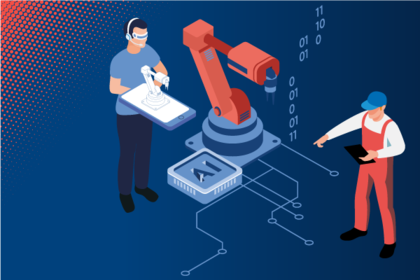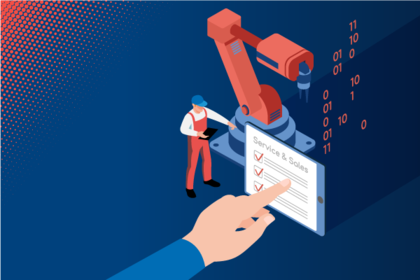How Industry 4.0 Optimizes Service
Industry 4.0 is not only transforming production, but aftersales and service too. Read on to find out what the term means, what opportunities are heralded by Industry 4.0, and how it improves service processes.
What is Industry 4.0?
Industry 4.0 essentially serves to network machines, components, and people. Communication takes place across the entire value chain – in other words not just internally but also with relevant parties outside the company, such as suppliers, logistics, and customers. Digital technologies expand expertise and facilitate the sharing of information in real time. The aim is to make production more efficient, more transparent, and more flexible. For companies in a wide range of industries, it is important to recognize not only the potential risks but above all the major opportunities afforded by Industry 4.0, and to exploit them for their own benefit.
What opportunities does Industry 4.0 offer machine manufacturers?
- Higher speed, improved efficiency, and greater flexibility in production: Intelligent production systems increase the efficiency of organization and processes, and this in turn can contribute to sustainability – for example through reduced energy consumption.
- Development of customer-centric solutions: Automation and batch sizes of a single unit are not mutually exclusive; flexible factory set-ups make it possible to manufacture customized products in small quantities at an affordable price, enabling companies to respond to the individual needs of individual customers.
- Intelligent data usage: Data sharing is possible throughout the entire life cycle. With the correct evaluation of data, there is great potential for its use in design, production, and service.
The role of digitalization in commercial success has long been recognized. According to a Bitkom study on Industry 4.0 from 2025, 81 percent of the 550 companies surveyed overwhelmingly see Industry 4.0 as an opportunity. At the time they were questioned, 71 percent were already using specific applications.
Companies that network and digitize their production are laying the foundations for future competitiveness. And the respondents agree: 96 percent consider Industry 4.0 to be critical to remaining competitive in the international marketplace.
How does Industry 4.0 work?
Industry 4.0 or the Internet of Things (IoT) lets machines and devices communicate with each other via the Internet. In this way, they can share and analyze relevant information, and initiate work steps independently.
For example, with the help of Industry 4.0 a machine is able to detect when it needs a spare part. It identifies the required part in an intelligent spare parts catalog and reports this to the customer or directly to the manufacturer who are then equipped with all the information they need to initiate a service order.
The machine is even able to detect parts that are likely to fail in the foreseeable future before any halt to production ensues. This allows it to independently order the relevant spare part from an intelligent spare parts catalog with shop function before it wears out, and trigger a service order. The situation can work in a similar way for maintenance and repair. This scenario is far from a pipe dream: such processes – using the Quanos spare parts catalog software and the right data – are already in operation right now.




